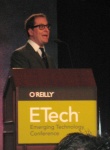Mike Kuniavsky (click to enlarge) |
Mike Kuniavsky, the founder of Adaptive Path, has a company called Thing M, a device design studio that "Lives at the intersections of ubiquitous computing, ambient intelligence, industrial design and materials science." He's giving a talk on The Coming Age of Magic.
The idea is that Moore's Law has pushed the price of computing so low that it is nearly disposable. Computing can be everywhere. People have talked about ubiquitous computing for a long time, but the era of cheap, low-power computing, and wireless communication has arrived.
We no longer need to serve as the knowledge intermediaries for computers, they can be embedded in objects to make the dynamic. What does this do to people's experiences?
People's reaction to ubiquitous computing devices is to consider them more like animals than they do to rocks and other inanimate objects. People know their Roomba isn't an animal, but they treat them that way.
He brings up the MagicCap OS developed by General Magic in the mid 90's and points out that a metaphor can be extended too far. While it's easy to mock something in retrospect, the point remains that taking the desktop metaphor beyond the desktop doesn't work.
To that point, sticking a largely unmodified PC into another device doesn't work. It creates an information management problem on top of the other problems that the device is designed to solve. You can't optimize your house. You can't produce leisure.
The answer is magic. Not in the traditional sense that people understand magic, but specifically in the sense of enchanted objects. This isn't pretending that technology is magic or lying about how technology works. It's an abstraction for describing how enchanted objects work.
What sets enchanted objects apart from their static counterparts is their ability to interact. They should be
- Everyday objects
- Familiar - look and act like you'd expect them to
- Physical - there is a physical use mode
- Screenless - no assumption that there's a text output
- Not human - no expectation that they behave like us
- Not superhuman - ultimately we're in control of the object
There are some devices now that have these properties. He references the Ambient Orb, the Nokia Medallion, the wand-like Nintendo Wii, and so on.
Ubiquitous computing is a by-product of market forces. Metaphor is emergent. Magic as a metaphor for ubiquitous computing is an emerging metaphor. Metaphor is powerful and we need to be conscious of its power or we end up over using it. Good magic should explain, not conceal deceive, or cripple.





